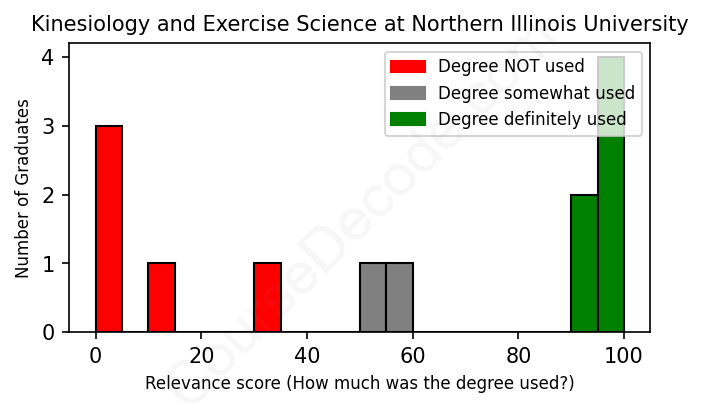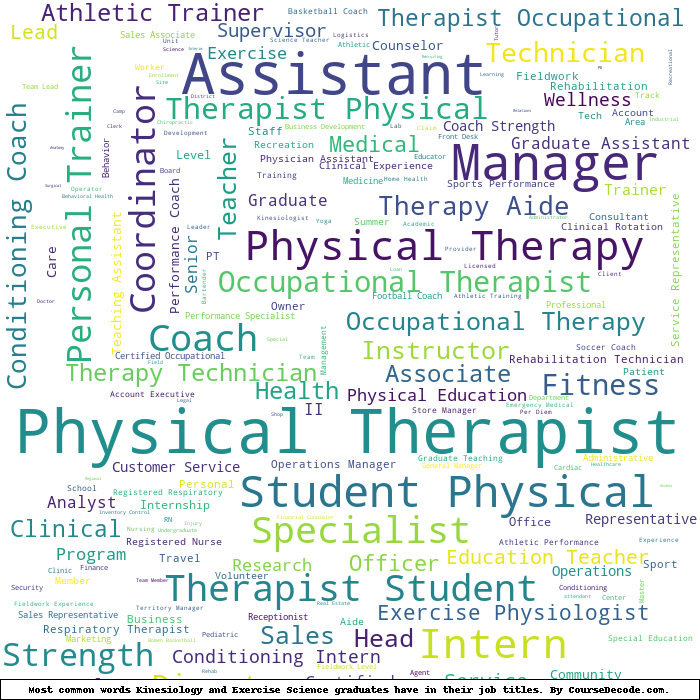
First, some facts. Of the Kinesiology and Exercise Science graduates from Northern Illinois University we've analyzed , here's how many have used (or NOT used) their degree in their career:

These are estimates based on AI analysis of 13 LinkedIn profiles (see below).
The verdict? Significantly below average. Overall, with an average relevance score of 56%, Kinesiology and Exercise Science graduates from Northern Illinois University have a much lower likelihood (-11%) of finding work in this field compared to the average graduate across all fields:
And for comparison, here's the chart for all profiles we've looked at across all degrees.
Also, after graduating, only 7% of these graduates have pursued further education other than another Bachelor's degree (such as a Masters degree or other), compared to the average across all profiles of 35%. This suggests a Bachelors degree is enough for most Kinesiology and Exercise Science graduates, and it's normal to look for work straight after graduation.
See the details:
|
Relevance score: 100% We think this person has gone into a career highly relevant to their degree. We think this person has gone into a career highly relevant to their degree.
DEGREE INFOGraduated in 2015 from Northern Illinois University with a Bachelors Degree in Kinesiology and Exercise Science. No other secondary education since. JOB HISTORY SINCE GRADUATIONPhysical Therapist Assistant/ Therapy Manager Olympia Chiropractic and Physical Therapy Mar 2015 - Jun 2016 Physical Therapist Assistant  DIAMOND PHYSICAL THERAPY AND REHABILITATION, PC Aug 2016 - Mar 2019 Physical Therapist Assistant  Midwestern orthopedic institute Mar 2019 - Present Physical Therapist Assistant  Northwestern Medicine Oct 2020 - Present ABOUTNo information provided. |
The top 10 most common jobs done by the graduates we've analyzed (ranked most common to least) are:
Looking at the job history of graduates with a degree in Kinesiology and Exercise Science from Northern Illinois University, it seems like there’s a bit of a mixed bag. A lot of these folks landed jobs that are not directly related to their field. For instance, managerial roles in retail, sales positions, and customer service jobs like bartending don’t really tap into the exercise science knowledge they gained during their studies. It’s kind of surprising to see how many ended up managing stores or working in sales, which doesn’t really need any specialized kinesiology skills. While some of these roles, like personal training and positions in physical therapy, do utilize their degree very well, they're definitely outnumbered by the unrelated jobs.
On the flip side, there are definitely some standout positions that really connect back to Kinesiology and Exercise Science, especially in personal training, physical therapy, and coaching roles. Positions like Physical Therapist Assistant, Exercise Physiologist, and Personal Trainer show strong ties to their academic background and prove that their education can be directly applied in real-world settings. However, overall, it seems like many graduates are not leveraging their degrees in their chosen career paths. This could be due to a variety of factors, such as job market conditions or personal preferences, but it definitely raises questions about how well these programs prepare students for relevant careers. In short, while there are some great examples of relevant employment, a significant number of students are working in jobs that don’t utilize their Kinesiology and Exercise Science education at all.
Here is a visual representation of the most common words in job titles for Kinesiology and Exercise Science graduates (this is across all Kinesiology and Exercise Science graduates we've analyzed, not just those who went to Northern Illinois University):

Looking at the career trajectories of graduates with a degree in Kinesiology and Exercise Science from Northern Illinois University, it seems that their first jobs often fall into the realm of personal training or related fields. Many graduates secure positions as personal trainers, exercise specialists, or take part in internships that focus on strength and conditioning. This initial phase appears to set a foundation in the health and fitness industry, which is in line with their academic background. However, as time progresses—about five to ten years after graduation—some of these individuals branch out beyond traditional roles directly related to Kinesiology. There are a notable number of alumni working in sales or managerial positions, which might seem a bit disconnected from their degrees, showing that not everyone sticks strictly to paths directly related to exercise science.
While some graduates have successfully transitioned into careers such as physical therapy assistants or exercise physiologists, others have taken on roles like store managers in retail or sales managers, which are less relevant to Kinesiology. This variation suggests that while there are promising opportunities in health and fitness directly linked to their studies, many may also find themselves in unrelated careers, potentially due to the competitive job market. Overall, it’s a mixed bag—some Kinesiology grads thrive in their field, enjoying fulfilling careers in health and wellness, while others drift into jobs far from their academic roots. So if you're considering this path, be prepared for both the chances of working in health and fitness or possibly exploring other industries along the way.
Honestly, a Bachelor’s degree in Kinesiology and Exercise Science can be a mixed bag, and it really depends on your interests and strengths. If you’re into fitness, biology, and understanding how the body moves, you might find it pretty engaging and not too tough. That said, there are definitely some challenging classes, especially when you get into anatomy and physiology, plus any lab work required. At Northern Illinois University, like many other schools, it can be manageable as long as you stay organized and keep up with your studies. So if you’re passionate about the subject, you might find it on the easier side of the spectrum compared to some other science-heavy majors. But if these topics don't excite you, it could feel a bit challenging!
Most commonly, in the LinkedIn profiles we've looked at, it takes people 4 years to finish a Bachelor degree in Kinesiology and Exercise Science.
Looking at these Kinesiology and Exercise Science grads from Northern Illinois University, it seems like they’ve been on a bit of a money rollercoaster. Some of them have moved into managerial and specialist roles, like the ones working at Firestone and Graymont Medical, which likely pay decently. However, others are still in positions like personal trainers and fitness interns, which can be iffy in terms of salary, especially early in their careers. Many in the fitness and health space don’t make the big bucks right out of college, and it might take some time to climb up the ladder. Overall, it’s a mixed bag—some seem to be doing alright, while others are still finding their footing in lower-paying jobs. So, while there’s potential for decent income, it really depends on their specific career paths and how quickly they can advance.
Here is a visual representation of the most common words seen in the "about" section of LinkedIn profiles who have a Bachelor degree in Kinesiology and Exercise Science (this is across all Kinesiology and Exercise Science graduates we've analyzed, not just those who went to Northern Illinois University). This may or may not be useful:

Here are all colleges offering a Bachelor degree in Kinesiology and Exercise Science (ordered by the average relevance score of their Kinesiology and Exercise Science graduates, best to worst) where we have analyzed at least 10 of their graduates: